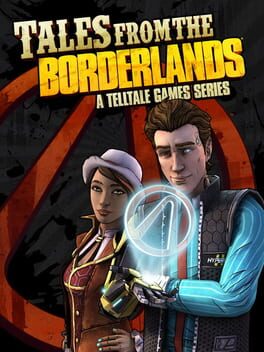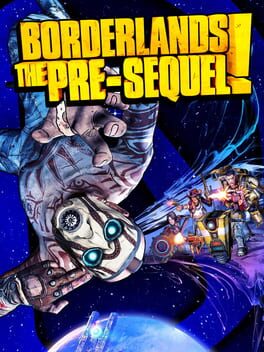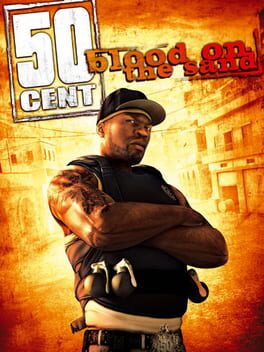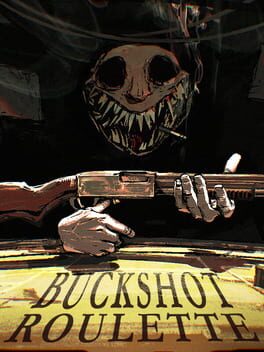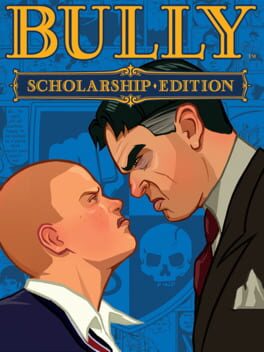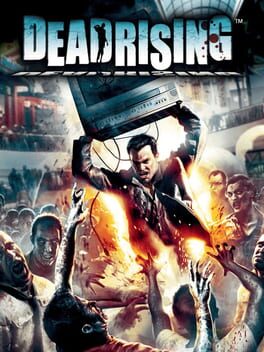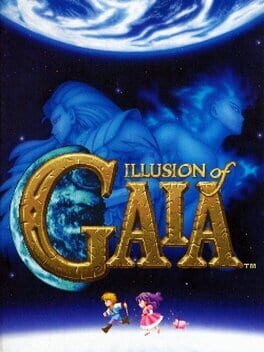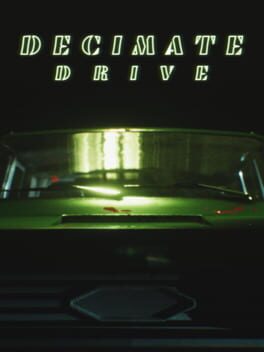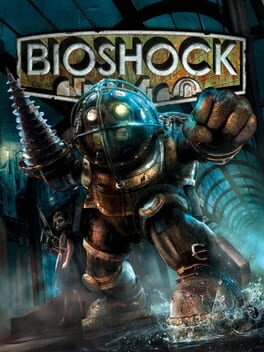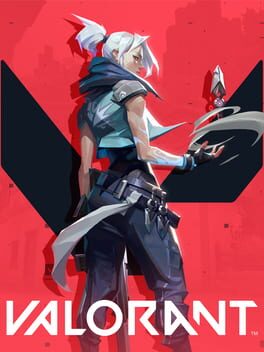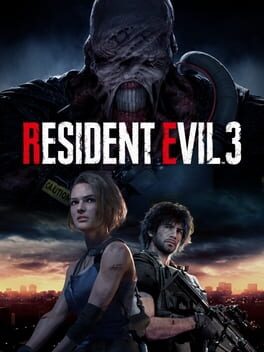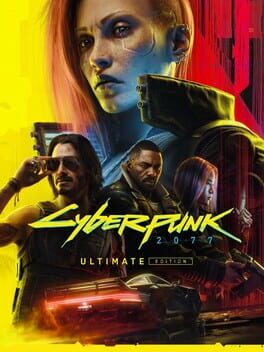Tibert
103 Reviews liked by Tibert
Im not a big fan of Telltale or this style of game, and Borderlands only barely works in this format - but Tales From The Borderlands is captivating for one real reason: it is meta-commentary. I have no clue if its on purpose but Rhys running around haunted by the literal ghost of Handsome Jack seems to curiously mirror how the series struggled to get out from under the shadow of Jack itself. Its a very poetic observation.
Its even more poetic considering that it doesnt seem like its worked out for Borderlands as a franchise quite as well as it did for Rhys. I also personally mourn the loss of mystique for Hyperion, made all too mortal and comprehensible by the events of Tales (made partially as a companion to the events of Pre-Sequel). Something of a bittersweet feeling emerges here: yes, Tales From The Borderlands is entertaining but its also…. not really Borderlands.
Its even more poetic considering that it doesnt seem like its worked out for Borderlands as a franchise quite as well as it did for Rhys. I also personally mourn the loss of mystique for Hyperion, made all too mortal and comprehensible by the events of Tales (made partially as a companion to the events of Pre-Sequel). Something of a bittersweet feeling emerges here: yes, Tales From The Borderlands is entertaining but its also…. not really Borderlands.
While technically a full complete standalone game, Pre-Sequel feels as tho it is simply a substantial extension of Borderlands 2 - and this massive DLC-like dynamic might explain why it feels just as janky and buggy as some of the DLCs do. The fact that this game serves mostly as fanservice for Handsome Jack makes it hard to care too much about its issues (tho maybe Gearbox took the wrong lessons from this)
Personally speaking, I was ready for more diversity in environments, and Elpis provides an excellent change in color palette; neon purples and blues and aquamarines. More time spent in space-age structures, lunar stations, energy refineries. Its a great vacation from Pandora, but I also feel like Pre-Sequel starts to pull the series out of orbit with too much focus on exposition, setting the series up to take itself too seriously. (The Handsome Jack stuff does whip ass tho)
Personally speaking, I was ready for more diversity in environments, and Elpis provides an excellent change in color palette; neon purples and blues and aquamarines. More time spent in space-age structures, lunar stations, energy refineries. Its a great vacation from Pandora, but I also feel like Pre-Sequel starts to pull the series out of orbit with too much focus on exposition, setting the series up to take itself too seriously. (The Handsome Jack stuff does whip ass tho)
Whispers hushed upon from fellow gamer,
“Brother we live as his retainer”,
Hymn’s echo down the chosen aisle,
as the crowd adjourn in single file,
The cloud room not but lay silent until chapel doors slam violent.
“Together we prayer upon his chair”
the Priest declares onto compliant stares,
as he turns to B-L-J up big, grand case of stair,
and look upon his shunned, crying heir,
“My sons gathered here in jury,
See the one who dares to question, one to query,
be this a lesson to those who's faith un-purely,
for he shall receive Doug Bowser’s Fury”.
“Brother we live as his retainer”,
Hymn’s echo down the chosen aisle,
as the crowd adjourn in single file,
The cloud room not but lay silent until chapel doors slam violent.
“Together we prayer upon his chair”
the Priest declares onto compliant stares,
as he turns to B-L-J up big, grand case of stair,
and look upon his shunned, crying heir,
“My sons gathered here in jury,
See the one who dares to question, one to query,
be this a lesson to those who's faith un-purely,
for he shall receive Doug Bowser’s Fury”.
I absolutely love this game. An absurd vanity project of a game that has boss fights implemented through the suggestion of 50 Cent's son. It's a fairly competent Gears of War clone. The mechanic where you get a score multiplier by clicking in the right stick to shout some swears after killing an enemy is inspired.
EarthBound
1994
I wanted to check this out since it inspired Undertale, one of my all-time favorite games. I'm sorry. I know there's an interesting story and lots of funny dialogue in here, but the inventory management is ridiculous and the slow walk speed combined with the slow combat was actually putting me to sleep.
Buckshot Roulette
2023
Love this crazy little game. It is crude and immature, fitting for the protagonist. It has a solid open world with good traversal options. Lots of memorable characters and tons of content. The story is so stupid and hilarious in all the right ways.
The motion controls work very very well for this version. Aiming is responsive and the extra enchantments and content add a lot to the experience.
It should be said as well, why I don't particularly care about games that do or don't have this, Jimmy can kiss guys or girls which makes him a very rare bisexual character, especially for a male character. I mainly appreciate how they don't draw any attention to it at all. If you make him one way or the other, or BOTH, it's not a big deal, which is how it should be in all media.
It's also very shocking how violent it is especially towards the younger students. You can full on body slam the middle schoolers in this game. I don't think that's something we're ever gonna see again...
This is just a great time throughout. Getting caught and chased by the adults can be annoying sometimes, but it's not enough to detract from the experience. It just oozes charm start to finish and you can't help but love it.
The motion controls work very very well for this version. Aiming is responsive and the extra enchantments and content add a lot to the experience.
It should be said as well, why I don't particularly care about games that do or don't have this, Jimmy can kiss guys or girls which makes him a very rare bisexual character, especially for a male character. I mainly appreciate how they don't draw any attention to it at all. If you make him one way or the other, or BOTH, it's not a big deal, which is how it should be in all media.
It's also very shocking how violent it is especially towards the younger students. You can full on body slam the middle schoolers in this game. I don't think that's something we're ever gonna see again...
This is just a great time throughout. Getting caught and chased by the adults can be annoying sometimes, but it's not enough to detract from the experience. It just oozes charm start to finish and you can't help but love it.
Dead Rising
2006
White man has been here? How can you tell? shows white people going loco oh wow they really amped up the drama hihihi, ok can you just follow me sir. I don't bite but they do. With one of the most bankruptely creative name in the industry yet, Dead Rising offers a painfully accurate american outbreak with all its quirks. It doesn't even feel that junk in retrospect... Oh i'm soooo lying that AI came out the wazzoo. Does it make some situations more memorable? Also yes, that's one of our realities. Holding hands has reached astronomical tediousness levels.
It's an interesting branch of roguelites. We could even call it a management sim the way you're gonna rewind that clock over and over in an attempt to maximize your PP, hard pause on that one but I done forgor what the letters stood for, I'll go ahead and make this up it means "Cock n' Ball Torture" there, no one's batting an eye because one knows what this game's really about. I'm getting that PP up when some woman zombie is munching on my private parts or when I'm taking a photo of a woman zombie munching on someone's private parts. A serious main story and the silliness we're subjected to outside of it is exactly the Yakuza brand, it's something the japanese really know how to do. They be knowin their silliness frfr.
I'm not even gonna discuss that main story, it's serviceable and survivors ratio + cope seethe. I don't know if survivors really is a good way to put it, they aren't surviving shit until the West comes along. And here I am changing into sneakers wearing a dress that would turn me into the belle of the bal, I'm built different they cannot mimic a fraction of my power. I can eat bullets no problem, chainsaws are a different issue but it's because West is wooden hard baby
It's an interesting branch of roguelites. We could even call it a management sim the way you're gonna rewind that clock over and over in an attempt to maximize your PP, hard pause on that one but I done forgor what the letters stood for, I'll go ahead and make this up it means "Cock n' Ball Torture" there, no one's batting an eye because one knows what this game's really about. I'm getting that PP up when some woman zombie is munching on my private parts or when I'm taking a photo of a woman zombie munching on someone's private parts. A serious main story and the silliness we're subjected to outside of it is exactly the Yakuza brand, it's something the japanese really know how to do. They be knowin their silliness frfr.
I'm not even gonna discuss that main story, it's serviceable and survivors ratio + cope seethe. I don't know if survivors really is a good way to put it, they aren't surviving shit until the West comes along. And here I am changing into sneakers wearing a dress that would turn me into the belle of the bal, I'm built different they cannot mimic a fraction of my power. I can eat bullets no problem, chainsaws are a different issue but it's because West is wooden hard baby
Illusion of Gaia
1993
Illusion of Gaia - presumably Soul Blazer's follow-up, set aside the town-building elements and opted for a linear, story-heavy action-adventure. This new approach awards stat boosts upon defeating monster rooms rather than hub progress, with unlockable special attacks serving as tools. But it's hard not to be reminded of Seiken Densetsu (and in particular its sequel, released a few months before IoG) while playing this Zelda/RPG hybrid: Unlike SD2, they aren't afraid to dabble in puzzles (best represented by its dedicated gimmick rooms). Unlike SD2, they can graft Zelda's clever solutions to the unique scenarios of JRPGs, and unlike SD2, combat's variety doesn't hinge on weapon types & magic (offering transformations, beat-em-up-esque collisions and follow-up strikes instead). They also compare favorably in regards to characters, dungeon designs + aesthetics, storytelling (whose emphasis, themes and quality were rare among action games at the time) and animations, losing only when it comes to battles (that turned to LoZ-grade poking with a few add-ons). If the RPG integration feels more cinematic than functional, and they've yet to learn how to balance boss fights, this game succeeds at recreating Final Fantasy Adventure from another - more narrative-driven and puzzle-y angle.
Decimate Drive
2023
Well-presented concept with great atmosphere and a deft but gentle execution of a quiet, sleepy, surreal city locked in perpetual night. Feint the cars slipping in and out of shadows like a matador, spontaneously animated in the cold of night with the sole agenda of severing you from this mortal coil - but by the end you will be yawning as it overstays its welcome maybe an hour longer than it needs to.
BioShock
2007
Valorant
2020
It takes a special kind of game to make me hate it as much as AM hated humans in "I have no mouth and I must scream", every grueling second I spent playing Valorant was miserable, and it got so bad it took me to the point where I genuinely thought for a moment that playing League or Overwatch are better experiences than playing this fucking thing, HATE. HATE IS ALL I FEEL FOR VALORANT
Resident Evil 3
2020
Takes the few special parts of the original game and throws them out the window without a second thought. The air of obligation, the creeping feeling that this only got made for completionism's sake, is almost sad. Props to whatever character designer got everyone to sign off on "early aughts Rachael Leigh Cook" for Jill though. If you want a real work of art about the pernicious forces of global capital performing experiments on an unwitting public, Josie and the Pussycats (2001) is right there!
"Loving V"
Mascara drenched-tears and gunfire. In the end I just stuck the iron in my mouth, pulled the trigger.
As V and Johnny sat on the roof of Misty's Esoterica, their voices drowned-out in the noises of Night City, Cyberpunk pulls me away at last, removes us from subjectivity by panning the camera out of this digitally-stricken body and towards a wider angle of two trajectories mercifully coming to a stop - deciding they wouldn’t play the game anymore. “Cleanest, least bloody option” she said. My first-person absorption within the computer-game was hence wholly consumed, putting V in front of me in a way that felt true to the experience of playing 2077’s broken, shimmering jank, the achievement of ending one’s life making sense of both our acts of roleplaying; mine as a holistic, experiential avenue and hers as dramatic diegesis given shape through the only language video-games seem to understand well enough, that is, the accumulation - and ultimate bubbling - of violence.
Shit felt terrible, no questions about it, something of the unfinished and unachievable kind - the right kind of wrong for once, first-person shooting in the directness of your face, forever. Suicide is exhaustion given infinite form and no language to remedy it’s omnipresence - that's no easy sentiment to tease out of me and it sure as hell ain’t a virtual one but Cyberpunk did succeed and I do not mean it as just another rejection of failed ludonarrative ventures, though this particular ending does carry with it an air of disdain for your decision to not act out the blaze of glory-seeking bravado that’s meant to close out the story. But I was exhausted. The wild circle of Cyberpunk 2077 goes both ways; cornucopia as trash and trash as cornucopia. All the narrative swings and systemic inconsistencies that fed from the ugliness of the work's dangling bits and in turn shone back some of their own light to form genuinely unique video-game sequences that deserve to be examined and contextualized on their own, beyond the meme, formed a world alright. All of it was too much. I could not play a minute longer, had - many times - threatened to pull the plug on 2020's most wildly surreal corporate art experiment and so finally I did. Hit the proverbial Blackwall in a sense. The artificial prose and passes ruling on this empire of code could not - and then would not - accommodate my presence within their simulation. Doesn't matter how towering or complex, a simple data block which we fuel with credence for the time it takes to wrestle with its fictitious circuitry remains just that in spite of itself. V and I were simply tired of sharing this body - a veritable second Silverhand I had become -, me attempting to imbue her with an essence that was never really there in the first place whilst she roared and raged to stay alive for another day or another hour, to exist inside the megalopolis of the dark future whatever the cost.
In the middle of this mounting heap of conflicted desires lied an encounter producing atomic material. Proper character-moments and personal voids, dejected ones. Times like “Automatic Love” and times like Takemura. Enough of those will fry your brains out. Make sure I can never come back nor forget Night City. From my continuous first-person to theirs - a third vision, on top of that apartment complex, saying things but really saying nothing at all because nothing is left to be said. And they're just there. And then they're not. And in this split-second where the linearity of your decisions establishes itself - this shift where the verb “interact” becomes “witness” - you realize, or at least I did, that you felt (no, feel) a certain type of way about her. The choice - if ever there was one - had been made from the start; all I did was press the button in an honest mistake. Enough play, more flatline.
“And in the bloodlit dark behind his eyes, silver phosphenes boiling in from the edge of space,
hypnagogic images jerking past like film compiled from random frames.
Symbols, figures, faces, a blurred, fragmented mandala of visual information.
Please, he prayed, now–”
Now the whole bathroom’s messed up and there’s vomit in the sink. Daddy is naked. Daddy’s blown a billion dollars down the drain in search of ray-traced fields yonder only leaving third-degree burns in his wake. This is not a video-game-centric problem but Video–games are the medium. Two years later, Phantom Liberty brings me back. V is brought forward from the dead, still fucking unstable, still drawing me in and I’m thinking to myself “Now is the moment”. Brand new chain, brand new RTX. I’m back not out of Edgerunners-fever but perhaps plain naïveté, thinking that I knew a way out. I knew, at least, of the Tower, this new epilogue that would let my V live out the rest of her days in Night City free of Silverhand’s cancerous engram, a character somewhat damaged and reformed - so I cultivated a plan. If my first journey was to be defined by the game’s egregore, then my second outing would act as its negative. Let blights and blessings wash over V in equal measures, see where the world of Cyberpunk would take me this time. A descent into roleplaying. Towards-
“A gray disk, the color of Chiba sky.
Now–”
A nowness. The septic tank of frame generation and path-tracing galore. Lights softly lashing out. A hundred paces into the grid. Immersion has always been at the heart of the 2077 project. A nowness, by which I mean the immediacy with which the game attempts to hold your attention and force you to engage with its world through the eyes of a digital construct. No computer software captures the push-and-pull of first-person like Cyberpunk which makes the failure deeper, almost more cutting. Soft games versus hard games - with 2077 in-between, attempting a hard act without the substantive arguments, building itself around a prefabricated fantasia of the subjective camera as this sort of all-encompassing dramatic cliché of immersion where the virtual gestures performed by V’s body are set and ordained through expensive cinematography instead of gameplay - draping itself in the robes of Deus Ex even as the meat falls off the bones to reveal an intense, almost angry focus on being a shooter first and foremost. It's that kind of teleguided rhythm which dictates the juiciest chunks of Cyberpunk's action-roleplay; a game that simply feels best when the gatling sings the cries of a thousand dead punk babies. And to these we add our faerie touch - a dialogue system skimming through flavour options as heavy stakes and lush set-pieces orient our gaze throughout CDPR’s theatrical exposé.
A nowness. When V shouts at the top of her lungs, when she’s desperately crawling her way out of a sky-wide hole. A nowness is when she touches another human being’s face, when she is touched and being looked at herself - which is why scenes like our confession at Clouds or Aurore’s appearance in «You Know My Name» hit such a fever. In their paranoid arousal lies a sincere expression of the hardships that come with human interaction in our day and age of disembodiment; searching for closure in a sex club, going full-on cyberpsycho, all of us, together alone. There and now. V is not, in other words, a character who expresses herself a lot through violence at the hands of the controller. In order to stab/stealth we must suppress this desire to get closer to the world she inhabits - replace it with the utility of conflict-solving, which is not to say that this violence serves no purpose. It is the sensory-deprivation chamber, the numbness you feel after sleeping the day-off; this dream that despondency fed every time you took the elevator to the 8th floor of H10 and were met with an aesthetical fart on the telly or every time the core was laid bare, exposed by bugs and cogs - because, yeah, everything feels slow, sluggish in Night City, as if the interplay between V and her numerous points of acquisition never quite met their intended target and instead underlined the facade of the whole structure in a way that feels relevant to the text, a text, not the one Cyberpunk 2077 is writing but the one written about and around it, a game that’s more than a game, filled to the brim with dead things that pretend to be alive. Anything to feel something in this place removed - so why not a shotgun blast?
A nowness without which the text of Cyberpunk would feel half-superfluous in truth. Suicide doesn’t happen without these empty pockets of play. My V needed this violence, this dishonesty, for her death to make sense of it all. But my affection only happens in the game’s jello, in this space where play's internal logic is superseded by the outbursts of tactile production riches. Sequences like the Heist or the Chimera boss-fight - one of Phantom Liberty’s many highlights -, our countless segues into the city's underbelly as societal observations games were never really well equipped to answer in the first place but which 2077 tackles with surprising softness at times and crass immaturity for large chunks of the road, punctuations in the routine of car rides and murder contracts; the lead in a detective story that’s always about touch - whether pyrotechnical or intimate - at the end of the tunnel. A nowness - an entrapment. It’s all the same to V.
“Disk beginning to rotate, faster, becoming a sphere of palergray.
Expanding-- And flowed, flowered for him, fluid neon origami trick,
the unfolding of his distance less home, his country, transparent 3D chessboard extending to infinity.”
Sometimes I get so tense while playing games that I forget to breathe. My fingers tense up, just enough that the tendons jerk back a little but not enough that it actually hurts in the long run, intermittently gritted teeth ease their pressure every dozens of second or so to let me swallow a little and I lean forward from the back of my chair like anyone who’s ever lost the first two rounds in a LAN. What I am describing here is not the buildup of tension that hard games tend to inflict upon the player - there’s joy (and an exchange) happening in that trade of blows, I think. No, what this situation feels like to me is a voicelessness in the matter of the video-game. The game having and very much using its voice to suppress mine as an action that does not scream of authorial intent so much as it aims to render the player mute. This is what these worlds, in their openness, do to us. They bloat and gurgle most - if any - possibility for expression to emerge within their likeness - to impart a certain elasticity of being to the fiction and its characters. For play to go in more than one direction at a time and meet these undercurrents, make them integral parts of the text. Night City is different in that it’s aesthetically crude and conscious of what the city is to us (what drives the player to seek out its spectacle) yet, as the strongest - sometimes only - voice in play by virtue of its open-ended nature, it cannot let go of two conceptions essential to its successes ; an idea of the player as a set of neurotic impulses (which we are) drawn in parallel to its own view of itself as a space that both seeks and belies simulation. Peaceful cohabitation between Cyberpunk’s slew of systems was never on the cards and so the most salient question anyone can ask of 2077 isn’t whether it answers every political point of aesthetics that’s been ascribed - rather pointlessly - to the genre but instead see a translation of play’s tropes into an actuation of its game-world through the following question: Is Night City A Walkable Paradise?
“Inner eye opening to the stepped scarlet pyramid of the Eastern Seaboard Fission Authority burning beyond the green cubes of Mitsubishi Bank of America,
and high and very far away he saw the spiral arms of military systems, forever beyond his reach.”
In one of my favourite early passages of Neuromancer, William Gibson describes a nowness. Through richly-textured streams of consciousness we get a glimpse of protagonist Case’s emotional ecstasy on the threshold between flesh and computer, a sort of strobe-lights reel akin to the religious experience of being visited by the Internet’s composite angel. This encounter with the world as perceived and rendered from our screens is the essence of Night City’s flash drive - that moment lived in the intersection, this longing that inhabits the mind and can only be met with an image of totality; every neon reflected in its corresponding surface, every aspect of reality densely explored by the weight of writing and asset-imprinted on the cornea itself. Baudrillard’s simulacrum realized. Night City is not a walkable paradise - it is a perceivable (video-game) one.
What I’m trying to get at is…we need an alternative. To get out of here. In this way 2077’s rendition of the "natural world" outside Night City is deeply moving to me; a barren, unstimulating expanse of polluted desert and dry grass that acts in contrast to everything else in Cyberpunk and makes itself vibrant whereas Wild Hunt's impressionistic canvases of aerial pine forests and ravaged country roads felt synthetic because, this time, there's no artifice. I drove there once in a haze. There was just too much light everywhere else. Blood spilled on halogen. Repetition, often empty conversations. An absent escape. So I just took Jackie’s ride and blasted past the Stateline, as fast as I could, because I wanted to remain in the game whilst simultaneously wanting out of it. Ditched my motorcycle and started walking, breathing a little in the shadow of wind turbines as the scenery unfolded before me. I think that’s due to this want - at least on my side - for the game world to work. Something’s leaking through the grapevine. We come back to open-worlds not because of their quality but because we believe they might one day attain the true colour of reflection and surpass their fragile status as simulated environments - hence the rise of A.I. and infinite terrain generation pushing a hollow artistic envelope. In this case a pedestrian motion invites a sort of contemplative boredom that is vital to traversal. Why else, for example, would CD Projekt RED insist on adding a fully functional metro system to Night City, years after the fact? A nowness. I value games where walking doesn’t feel redundant. I value this stride towards play outside of ravenous incentives supposed to inform the wider context of the story the game's trying to tell instead of distracting me, as something that smells like games but only binds us to physical limitations insofar as they evoke something within us. This is the heart of Cyberpunk 2077 - the thing it’s reaching for. A game trying to use the framework in order to bypass it. Unlimited budget in the service of capital’s immersive production of a nowness within which players could nest themselves. What V embodies then in my eyes is this effort to push past “the new and improved meaning vacuums, where the only thing that mattered, and the only thing that players could rely on and relate to, were their own individual experiences” created by the contemporary sandboxed open-world. Why would we wanna leave? And isn’t that wish for immersion worth examining in itself? Despite what it does to a human heart?
Night City is not strong enough to hold down the fort. But in instances like the one(s) I’ve just described it’s stumbling, perhaps half-knowingly, into player-engineered but space-emergent resonances, and the people at CDPR - for all their evident lack of swagger - know that too. This time V didn’t kill herself. She just stayed there in the heat of perpetual summer, jumping over rock geometries, listening to SAMURAI on the radio for a while, before riding back into the heart of the city one last time. I quit the game and got down to writing. There's so much more to life than this. But it’s also all there is. We're in it for the love of the game, for the slices of life - roleplaying for the briefest of moments, calling a dead friend's phone number, sharing a room with Judy for the night knowing full well the moment will pass, too. Pulling the trigger or, even, leaving Night City altogether. Whether V lives or dies and by which hands she chooses to do so matter equally because this fate is hers and hers alone, in that final pull-back of the curtains where we become mere observers of a story which - both by design and happenstance - never really belonged to us in the first place. It's impossible not to hold some regrets in departing from a perspective we willingly populated with our own thoughts and choices for so many hours yet becoming relevant to us at the exact moment agency stops being a factor. V walks - just not in the same city as us. Like this image of Reed at the end of Phantom Liberty drifting-off into the desert, towards the uncaring sun of empire. "Sand's fucking hot", V says. Burning at the proper temperature it will shrivel into new matter, becoming glass before scattering again like the ashen shards of a bygone mirror. We're always left to pick up the pieces, thinking that this time things will be different, and they never are, but we keep trying. A nowness is a phenomenon forever incomplete - affixed to the interactivity of the present, incapable of seeing beyond its own immersion. But it's also a possibility for change; this hope that, maybe one day, through the experience of others - with others - we could better understand ourselves. Walk alongside the rest of Night City. Touch the same soil as V.
A nowness–
"And somewhere he was laughing,
in a white-painted loft,
distant fingers caressing the deck,
tears of release streaking his face."
–Neuromancer, Chapter 3, William Gibson, 1984
Mascara drenched-tears and gunfire. In the end I just stuck the iron in my mouth, pulled the trigger.
As V and Johnny sat on the roof of Misty's Esoterica, their voices drowned-out in the noises of Night City, Cyberpunk pulls me away at last, removes us from subjectivity by panning the camera out of this digitally-stricken body and towards a wider angle of two trajectories mercifully coming to a stop - deciding they wouldn’t play the game anymore. “Cleanest, least bloody option” she said. My first-person absorption within the computer-game was hence wholly consumed, putting V in front of me in a way that felt true to the experience of playing 2077’s broken, shimmering jank, the achievement of ending one’s life making sense of both our acts of roleplaying; mine as a holistic, experiential avenue and hers as dramatic diegesis given shape through the only language video-games seem to understand well enough, that is, the accumulation - and ultimate bubbling - of violence.
Shit felt terrible, no questions about it, something of the unfinished and unachievable kind - the right kind of wrong for once, first-person shooting in the directness of your face, forever. Suicide is exhaustion given infinite form and no language to remedy it’s omnipresence - that's no easy sentiment to tease out of me and it sure as hell ain’t a virtual one but Cyberpunk did succeed and I do not mean it as just another rejection of failed ludonarrative ventures, though this particular ending does carry with it an air of disdain for your decision to not act out the blaze of glory-seeking bravado that’s meant to close out the story. But I was exhausted. The wild circle of Cyberpunk 2077 goes both ways; cornucopia as trash and trash as cornucopia. All the narrative swings and systemic inconsistencies that fed from the ugliness of the work's dangling bits and in turn shone back some of their own light to form genuinely unique video-game sequences that deserve to be examined and contextualized on their own, beyond the meme, formed a world alright. All of it was too much. I could not play a minute longer, had - many times - threatened to pull the plug on 2020's most wildly surreal corporate art experiment and so finally I did. Hit the proverbial Blackwall in a sense. The artificial prose and passes ruling on this empire of code could not - and then would not - accommodate my presence within their simulation. Doesn't matter how towering or complex, a simple data block which we fuel with credence for the time it takes to wrestle with its fictitious circuitry remains just that in spite of itself. V and I were simply tired of sharing this body - a veritable second Silverhand I had become -, me attempting to imbue her with an essence that was never really there in the first place whilst she roared and raged to stay alive for another day or another hour, to exist inside the megalopolis of the dark future whatever the cost.
In the middle of this mounting heap of conflicted desires lied an encounter producing atomic material. Proper character-moments and personal voids, dejected ones. Times like “Automatic Love” and times like Takemura. Enough of those will fry your brains out. Make sure I can never come back nor forget Night City. From my continuous first-person to theirs - a third vision, on top of that apartment complex, saying things but really saying nothing at all because nothing is left to be said. And they're just there. And then they're not. And in this split-second where the linearity of your decisions establishes itself - this shift where the verb “interact” becomes “witness” - you realize, or at least I did, that you felt (no, feel) a certain type of way about her. The choice - if ever there was one - had been made from the start; all I did was press the button in an honest mistake. Enough play, more flatline.
“And in the bloodlit dark behind his eyes, silver phosphenes boiling in from the edge of space,
hypnagogic images jerking past like film compiled from random frames.
Symbols, figures, faces, a blurred, fragmented mandala of visual information.
Please, he prayed, now–”
Now the whole bathroom’s messed up and there’s vomit in the sink. Daddy is naked. Daddy’s blown a billion dollars down the drain in search of ray-traced fields yonder only leaving third-degree burns in his wake. This is not a video-game-centric problem but Video–games are the medium. Two years later, Phantom Liberty brings me back. V is brought forward from the dead, still fucking unstable, still drawing me in and I’m thinking to myself “Now is the moment”. Brand new chain, brand new RTX. I’m back not out of Edgerunners-fever but perhaps plain naïveté, thinking that I knew a way out. I knew, at least, of the Tower, this new epilogue that would let my V live out the rest of her days in Night City free of Silverhand’s cancerous engram, a character somewhat damaged and reformed - so I cultivated a plan. If my first journey was to be defined by the game’s egregore, then my second outing would act as its negative. Let blights and blessings wash over V in equal measures, see where the world of Cyberpunk would take me this time. A descent into roleplaying. Towards-
“A gray disk, the color of Chiba sky.
Now–”
A nowness. The septic tank of frame generation and path-tracing galore. Lights softly lashing out. A hundred paces into the grid. Immersion has always been at the heart of the 2077 project. A nowness, by which I mean the immediacy with which the game attempts to hold your attention and force you to engage with its world through the eyes of a digital construct. No computer software captures the push-and-pull of first-person like Cyberpunk which makes the failure deeper, almost more cutting. Soft games versus hard games - with 2077 in-between, attempting a hard act without the substantive arguments, building itself around a prefabricated fantasia of the subjective camera as this sort of all-encompassing dramatic cliché of immersion where the virtual gestures performed by V’s body are set and ordained through expensive cinematography instead of gameplay - draping itself in the robes of Deus Ex even as the meat falls off the bones to reveal an intense, almost angry focus on being a shooter first and foremost. It's that kind of teleguided rhythm which dictates the juiciest chunks of Cyberpunk's action-roleplay; a game that simply feels best when the gatling sings the cries of a thousand dead punk babies. And to these we add our faerie touch - a dialogue system skimming through flavour options as heavy stakes and lush set-pieces orient our gaze throughout CDPR’s theatrical exposé.
A nowness. When V shouts at the top of her lungs, when she’s desperately crawling her way out of a sky-wide hole. A nowness is when she touches another human being’s face, when she is touched and being looked at herself - which is why scenes like our confession at Clouds or Aurore’s appearance in «You Know My Name» hit such a fever. In their paranoid arousal lies a sincere expression of the hardships that come with human interaction in our day and age of disembodiment; searching for closure in a sex club, going full-on cyberpsycho, all of us, together alone. There and now. V is not, in other words, a character who expresses herself a lot through violence at the hands of the controller. In order to stab/stealth we must suppress this desire to get closer to the world she inhabits - replace it with the utility of conflict-solving, which is not to say that this violence serves no purpose. It is the sensory-deprivation chamber, the numbness you feel after sleeping the day-off; this dream that despondency fed every time you took the elevator to the 8th floor of H10 and were met with an aesthetical fart on the telly or every time the core was laid bare, exposed by bugs and cogs - because, yeah, everything feels slow, sluggish in Night City, as if the interplay between V and her numerous points of acquisition never quite met their intended target and instead underlined the facade of the whole structure in a way that feels relevant to the text, a text, not the one Cyberpunk 2077 is writing but the one written about and around it, a game that’s more than a game, filled to the brim with dead things that pretend to be alive. Anything to feel something in this place removed - so why not a shotgun blast?
A nowness without which the text of Cyberpunk would feel half-superfluous in truth. Suicide doesn’t happen without these empty pockets of play. My V needed this violence, this dishonesty, for her death to make sense of it all. But my affection only happens in the game’s jello, in this space where play's internal logic is superseded by the outbursts of tactile production riches. Sequences like the Heist or the Chimera boss-fight - one of Phantom Liberty’s many highlights -, our countless segues into the city's underbelly as societal observations games were never really well equipped to answer in the first place but which 2077 tackles with surprising softness at times and crass immaturity for large chunks of the road, punctuations in the routine of car rides and murder contracts; the lead in a detective story that’s always about touch - whether pyrotechnical or intimate - at the end of the tunnel. A nowness - an entrapment. It’s all the same to V.
“Disk beginning to rotate, faster, becoming a sphere of palergray.
Expanding-- And flowed, flowered for him, fluid neon origami trick,
the unfolding of his distance less home, his country, transparent 3D chessboard extending to infinity.”
Sometimes I get so tense while playing games that I forget to breathe. My fingers tense up, just enough that the tendons jerk back a little but not enough that it actually hurts in the long run, intermittently gritted teeth ease their pressure every dozens of second or so to let me swallow a little and I lean forward from the back of my chair like anyone who’s ever lost the first two rounds in a LAN. What I am describing here is not the buildup of tension that hard games tend to inflict upon the player - there’s joy (and an exchange) happening in that trade of blows, I think. No, what this situation feels like to me is a voicelessness in the matter of the video-game. The game having and very much using its voice to suppress mine as an action that does not scream of authorial intent so much as it aims to render the player mute. This is what these worlds, in their openness, do to us. They bloat and gurgle most - if any - possibility for expression to emerge within their likeness - to impart a certain elasticity of being to the fiction and its characters. For play to go in more than one direction at a time and meet these undercurrents, make them integral parts of the text. Night City is different in that it’s aesthetically crude and conscious of what the city is to us (what drives the player to seek out its spectacle) yet, as the strongest - sometimes only - voice in play by virtue of its open-ended nature, it cannot let go of two conceptions essential to its successes ; an idea of the player as a set of neurotic impulses (which we are) drawn in parallel to its own view of itself as a space that both seeks and belies simulation. Peaceful cohabitation between Cyberpunk’s slew of systems was never on the cards and so the most salient question anyone can ask of 2077 isn’t whether it answers every political point of aesthetics that’s been ascribed - rather pointlessly - to the genre but instead see a translation of play’s tropes into an actuation of its game-world through the following question: Is Night City A Walkable Paradise?
“Inner eye opening to the stepped scarlet pyramid of the Eastern Seaboard Fission Authority burning beyond the green cubes of Mitsubishi Bank of America,
and high and very far away he saw the spiral arms of military systems, forever beyond his reach.”
In one of my favourite early passages of Neuromancer, William Gibson describes a nowness. Through richly-textured streams of consciousness we get a glimpse of protagonist Case’s emotional ecstasy on the threshold between flesh and computer, a sort of strobe-lights reel akin to the religious experience of being visited by the Internet’s composite angel. This encounter with the world as perceived and rendered from our screens is the essence of Night City’s flash drive - that moment lived in the intersection, this longing that inhabits the mind and can only be met with an image of totality; every neon reflected in its corresponding surface, every aspect of reality densely explored by the weight of writing and asset-imprinted on the cornea itself. Baudrillard’s simulacrum realized. Night City is not a walkable paradise - it is a perceivable (video-game) one.
What I’m trying to get at is…we need an alternative. To get out of here. In this way 2077’s rendition of the "natural world" outside Night City is deeply moving to me; a barren, unstimulating expanse of polluted desert and dry grass that acts in contrast to everything else in Cyberpunk and makes itself vibrant whereas Wild Hunt's impressionistic canvases of aerial pine forests and ravaged country roads felt synthetic because, this time, there's no artifice. I drove there once in a haze. There was just too much light everywhere else. Blood spilled on halogen. Repetition, often empty conversations. An absent escape. So I just took Jackie’s ride and blasted past the Stateline, as fast as I could, because I wanted to remain in the game whilst simultaneously wanting out of it. Ditched my motorcycle and started walking, breathing a little in the shadow of wind turbines as the scenery unfolded before me. I think that’s due to this want - at least on my side - for the game world to work. Something’s leaking through the grapevine. We come back to open-worlds not because of their quality but because we believe they might one day attain the true colour of reflection and surpass their fragile status as simulated environments - hence the rise of A.I. and infinite terrain generation pushing a hollow artistic envelope. In this case a pedestrian motion invites a sort of contemplative boredom that is vital to traversal. Why else, for example, would CD Projekt RED insist on adding a fully functional metro system to Night City, years after the fact? A nowness. I value games where walking doesn’t feel redundant. I value this stride towards play outside of ravenous incentives supposed to inform the wider context of the story the game's trying to tell instead of distracting me, as something that smells like games but only binds us to physical limitations insofar as they evoke something within us. This is the heart of Cyberpunk 2077 - the thing it’s reaching for. A game trying to use the framework in order to bypass it. Unlimited budget in the service of capital’s immersive production of a nowness within which players could nest themselves. What V embodies then in my eyes is this effort to push past “the new and improved meaning vacuums, where the only thing that mattered, and the only thing that players could rely on and relate to, were their own individual experiences” created by the contemporary sandboxed open-world. Why would we wanna leave? And isn’t that wish for immersion worth examining in itself? Despite what it does to a human heart?
Night City is not strong enough to hold down the fort. But in instances like the one(s) I’ve just described it’s stumbling, perhaps half-knowingly, into player-engineered but space-emergent resonances, and the people at CDPR - for all their evident lack of swagger - know that too. This time V didn’t kill herself. She just stayed there in the heat of perpetual summer, jumping over rock geometries, listening to SAMURAI on the radio for a while, before riding back into the heart of the city one last time. I quit the game and got down to writing. There's so much more to life than this. But it’s also all there is. We're in it for the love of the game, for the slices of life - roleplaying for the briefest of moments, calling a dead friend's phone number, sharing a room with Judy for the night knowing full well the moment will pass, too. Pulling the trigger or, even, leaving Night City altogether. Whether V lives or dies and by which hands she chooses to do so matter equally because this fate is hers and hers alone, in that final pull-back of the curtains where we become mere observers of a story which - both by design and happenstance - never really belonged to us in the first place. It's impossible not to hold some regrets in departing from a perspective we willingly populated with our own thoughts and choices for so many hours yet becoming relevant to us at the exact moment agency stops being a factor. V walks - just not in the same city as us. Like this image of Reed at the end of Phantom Liberty drifting-off into the desert, towards the uncaring sun of empire. "Sand's fucking hot", V says. Burning at the proper temperature it will shrivel into new matter, becoming glass before scattering again like the ashen shards of a bygone mirror. We're always left to pick up the pieces, thinking that this time things will be different, and they never are, but we keep trying. A nowness is a phenomenon forever incomplete - affixed to the interactivity of the present, incapable of seeing beyond its own immersion. But it's also a possibility for change; this hope that, maybe one day, through the experience of others - with others - we could better understand ourselves. Walk alongside the rest of Night City. Touch the same soil as V.
A nowness–
"And somewhere he was laughing,
in a white-painted loft,
distant fingers caressing the deck,
tears of release streaking his face."
–Neuromancer, Chapter 3, William Gibson, 1984
